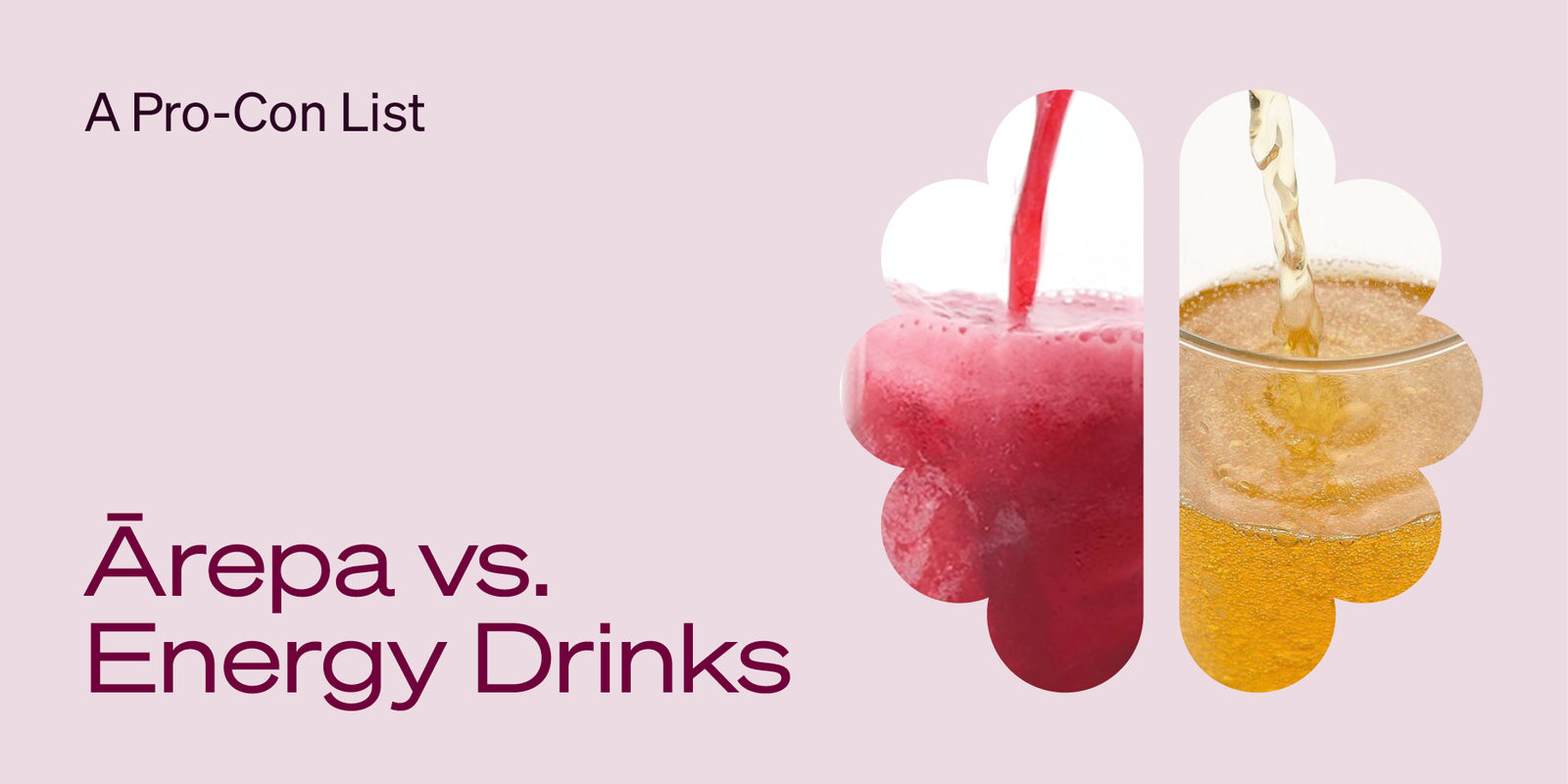Your Cart is Empty
Free Shipping on orders over $100 🚚
Free Shipping on orders over $100 🚚
Where is your Brain?
Your brain is amazing. Select your country's website to access the world's best scientifically proven Brainfood.
Ārepa vs Energy Drinks
August 10, 2022 3 min read

Energy drinks are widely promoted as products that increase energy and enhance mental alertness and physical performance. Next to multivitamins, energy drinks are the most popular dietary supplement consumed by teenagers and young adults. Men between the ages of 18 and 34 years consume the most energy drinks, and almost one-third of teens between 12 and 17 years drink them regularly.
Caffeine is a major ingredient in energy drink products—at levels of 70 to 240 mg in a 200ml can (For comparison, your average cup of coffee contains about 50 - 150mg.) Energy drinks also may contain other ingredients such as guarana (another source of caffeine sometimes called Brazilian cocoa), sugars, taurine, ginseng, B vitamins, glucuronolactone, yohimbe, carnitine, and bitter orange.

So what's the problem?
A growing body of scientific evidence shows that energy drinks can have serious health effects, particularly in children, teenagers, and young adults.
In several studies, energy drinks have been found to improve physical endurance, but there’s less evidence of any effect on muscle strength or power. Energy drinks may enhance alertness and improve reaction time, but they may also reduce steadiness of the hands.
Consuming energy drinks raises important safety concerns:
- About 25 percent of uni students consume alcohol with energy drinks, and they binge-drink significantly more often than students who don’t mix them.
- The CDC reports that drinkers aged 15 to 23 who mix alcohol with energy drinks are four times more likely to binge drink at high intensity (i.e., consume six or more drinks per binge episode) than drinkers who do not mix alcohol with energy drinks.
The amounts of caffeine in energy drinks vary widely, and the actual caffeine content may not be identified easily. Some energy drinks are marketed as beverages and others as dietary supplements. There’s no requirement to declare the amount of caffeine on the label of either type of product.
How unsafe is it?
- Large amounts of caffeine may cause serious heart and blood vessel problems such as heart rhythm disturbances and increases in heart rate and blood pressure. Caffeine also may harm children’s still-developing cardiovascular and nervous systems.
- Caffeine use may also be associated with anxiety, sleep problems, digestive problems, and dehydration.
- Guarana, commonly included in energy drinks, contains caffeine. Therefore, the addition of guarana increases the drink’s total caffeine content.
- People who combine caffeinated drinks with alcohol may not be able to tell how intoxicated they are; they may feel less intoxicated than they would if they had not consumed caffeine, but their motor coordination and reaction time may be just as impaired.
- Excessive energy drink consumption may disrupt teens’ sleep patterns and may be associated with increased risk-taking behaviour.
- A single 200ml container of an energy drink may contain 54 to 62 grams of added sugar; this exceeds the maximum amount of added sugars recommended for an entire day.

We are proud to say our products contain no caffeine, nor will they ever. The felt effects that many customers talk about which feel like they are getting an "energy boost" † like those felt through an energy drink, are simply the effects of our ingredients, resulting in an elevated or enhanced mental edge. Ārepa is also all natural, formulated by a world-leading neuroscientist with Pine Bark Extract, L-theanine, plus Neuroberry Blackcurrants packed with vitamin C to support focus and help unlock energy, as part of a healthy and varied diet.†
The most achievable way to decrease or curb the habit is to find healthy alternatives, such as Ārepa, that you can replace it with. Next time you find yourself reaching for an energy drink, think about the long-term effect on your body and perhaps reach for a bit of Brainfood instead.†
Leave a comment
Comments will be approved before showing up.

















